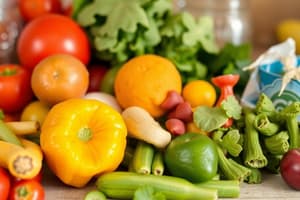Podcast
Questions and Answers
What is the main consequence of food insecurity on health?
What is the main consequence of food insecurity on health?
- Decreased physical activity
- Improved mental health
- Negative impacts on physical, mental, and social health (correct)
- Increased nutritional intake
Which category of food insecurity involves a worry about running out of food?
Which category of food insecurity involves a worry about running out of food?
- Chronic food insecurity
- Severe food insecurity
- Marginal food insecurity (correct)
- Moderate food insecurity
What significant financial burden did Canadian families face in 2022 regarding food costs?
What significant financial burden did Canadian families face in 2022 regarding food costs?
- No significant change
- An increase of $966 (correct)
- An increase of $1,200
- An increase of $600
What describes food deserts?
What describes food deserts?
How do traditional food systems contribute to Indigenous communities?
How do traditional food systems contribute to Indigenous communities?
Flashcards
Food Security
Food Security
The consistent access to enough, safe, and nutritious food for everyone.
Food Desert
Food Desert
Areas where it's hard to find affordable, fresh food, often in cities.
Food Insecurity
Food Insecurity
A situation when people struggle to get enough food due to financial problems.
Traditional Food Systems
Traditional Food Systems
Signup and view all the flashcards
Food Banks
Food Banks
Signup and view all the flashcards
Study Notes
Food Security in Canada
- Food security encompasses consistent access to sufficient, safe, and nutritious food for everyone.
- Key aspects include availability, accessibility, acceptability, adequacy, and sustainability.
- Food insecurity arises from inadequate or unstable access to food due to financial constraints.
- Food insecurity negatively affects physical, mental, and social health, leading to higher healthcare costs.
Categories of Food Insecurity
- Marginal food insecurity: Concerns about running out of food or limited choices.
- Moderate food insecurity: Compromises in food quality or quantity.
- Severe food insecurity: Skipping meals, reduced intake, or going without food for days.
Food Deserts
- Food deserts are urban areas with limited access to affordable and fresh food.
COVID-19 Impact on Food Costs
- Grocery prices increased by 5-7% in 2022.
- Canadian families faced a $966 rise in food costs in 2022, with total annual food bills reaching $14,767.
Food Banks in Canada
- Canada's food banks provide support for those facing food needs.
- Their mission is to alleviate hunger through partnerships with various organizations.
Food Security in Indigenous Communities
- Food prices in First Nations reserves are substantially higher than in other areas (e.g., $115 for a $50 grocery shop).
- Income levels are generally low, compounding affordability issues.
- COVID-19 significantly increased challenges in shipping food to remote communities.
Traditional Food Systems
- Indigenous communities retain traditional food-gathering practices like hunting and gathering.
- Their traditional systems include diverse food sources: wild meats, fish, birds, plants, and berries.
- These practices contribute to physical health, cultural identity, and environmental awareness.
Studying That Suits You
Use AI to generate personalized quizzes and flashcards to suit your learning preferences.




